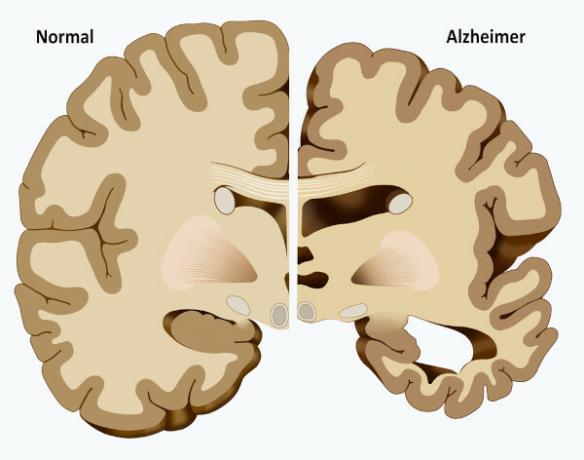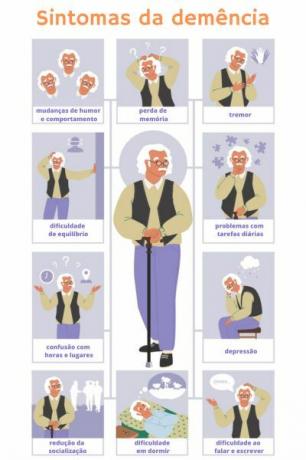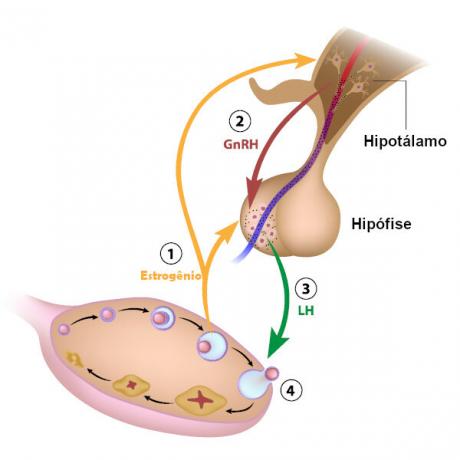Insanity is an “umbrella” term for a set of diseases and symptoms that affect the cognition and, consequently, the daily activities of millions of people around the world. Dementia can manifest itself in a variety of ways, including Alzheimer's disease the most common of them.
Symptoms of dementia include memory loss, difficulty making decisions, mental confusion, and deterioration of motor and communication skills. As the disease progresses, patients' independence and quality of life decrease, making support from family and caregivers even more essential.
Despite advances, there is still no definitive cure for most dementias. Drug treatment consists of reducing the speed of disease progression, improving patients' quality of life and alleviating the challenges faced by caregivers.
Read too: Aphasia — another type of disorder associated with brain damage
Topics in this article
- 1 - Summary about dementia
- 2 - What is dementia?
- 3 - What causes dementia?
-
4 - Types of dementia
- → Primary group
- → Secondary group
- → Health problems with dementia-like symptoms
- 5 - Symptoms of dementia
- 6 - Diagnosis of dementia
- 7 - Is dementia curable?
- 8 - How to deal with a person with dementia?
- 9 - Prevention of dementia
- 10 - Risk factors for developing dementia
- 11 - What is the difference between Alzheimer's and dementia?
- 12 - Life expectancy of a person with dementia
Dementia Summary
- Dementia encompasses several diseases and symptoms that lead to a gradual decline in cognition.
- The main symptoms include memory loss, mental confusion, difficulty communicating and impaired motor skills.
- Alzheimer's disease is the most common cause of dementia, but there are several other neurodegenerative conditions that can lead to dementia.
- Dementia is progressive and gets worse over time.
- The diagnosis is made through a combination of clinical assessment, laboratory and imaging tests, as well as neuropsychological tests.
- There is no cure, but available medications help control symptoms and improve quality of life.
- Family members and carers play a crucial role in supporting people with dementia.
What is dementia?
Dementia is a general term used to describe a set of diseases characterized by the gradual decline of cognitive functions, interfering with a person's daily activities. Cognitive functions encompass our ability to interact with the environment, collect information from it and make appropriate decisions at each moment, and include thinking, the memory, reasoning, emotions, behaviors and relationships.
Dementia affects approximately 50 million people worldwide, and this number is expected to increase to 131 million by 2050. This condition is more common in the elderly, and approximately one third of individuals over the age of 85 have some form of dementia.
Due to this high incidence, dementia It is also known as “senility” or “senile dementia”. However, it is important to highlight that the use of these terms is incorrect and perpetuates the belief that mental decline It's a natural part of aging. This notion is not true, since many people can reach the age of 90 or more without showing signs of dementia.
Do not stop now... There's more after the advertising ;)
What causes dementia?
Dementia is the result of neuron damage (nerve cells) that impair communication between them, making it impossible to perform their normal functions. These damages may occurdue to blockage of blood flow to the brain, depriving it of necessary oxygen and nutrients, which leads to the death and deterioration of brain tissue.
Neuronal damage can be localized in specific regions of the brain, and as each area is responsible for different functions, Different types of dementia are associated with specific harms. One example is Alzheimer's disease, in which the first damaged cells are in the hippocampus, the brain's learning and memory center. This explains memory loss as one of the first symptoms associated with this disease.

Types of dementia
Dementia can be classified inthree groups:
→ Primary group
These are diseases in which dementia is the main condition. They are usually irreversible and progressive. Examples include:
- Alzheimer's disease: the most common form of dementia in the elderly, caused by brain changes such as the abnormal accumulation of proteins known as amyloid plaques and tau tangles.
- Frontotemporal dementia: a rare form that tends to occur in people under 60, associated with abnormal amounts of tau proteins and TDP-43.
- Vascular dementia: results from damage to cerebral blood vessels or interruption of the flow of blood and oxygen to the brain.
- Mixed dementia: is a combination of two or more types of dementia.
→ Secondary group
Dementia occurs as consequence of other diseases or conditions, generally when they are already in their advanced stage. Examples include Huntington's disease, Parkinson's disease and brain trauma.
→ Health problems with dementia-like symptoms
These are conditions treatable and reversible with symptoms that resemble dementia, such as medication side effects, brain tumors, metabolic and endocrine conditions, vitamin deficiency (mainly B6, B1 and B12) and infections (HIV, syphilis and Lyme disease, for example).
See too:Brain cancer — causes and main symptoms
Symptoms of dementia

Symptoms of dementia are progressive, meaning signs of cognitive impairment start slowly and gradually worsen over time. Furthermore, they may vary depending on the area of the brain involved.
Some initial general symptoms of dementia they are:
- forgetting recent events or information;
- difficulty finding the right words;
- repetition of comments or questions in a short period;
- placement of common items in unusual places;
- change in mood, behavior or interests.
The progression of the disease brings other more serious symptoms, such as:
- further decline in the ability to remember and make decisions;
- motor difficulty in performing daily tasks such as brushing teeth, taking a shower, eating, operating a TV remote control, cooking and paying bills;
- decreased rational thinking and problem-solving ability;
- changes in sleep pattern;
- multiple infections;
- increased or worsening anxiety, frustration, confusion, agitation, sadness and/or depression;
- loss of appetite;
- presence of hallucinations;
- urinary and fecal incontinence.
Diagnosis of dementia
Diagnosing dementia is a complex process that requires a set of information to determine the type of dementia, as the symptoms and brain changes of different types of dementia can be overlap. In some cases, a doctor may diagnose "dementia" without specifying the type. Generally, the following resources are used:
- Medical history: a detailed medical history is essential, covering information about previous symptoms and family history of neurological diseases.
- Behavioral assessment: Doctors note the characteristic changes in thinking, daily function, and behavior associated with each type of dementia.
- Laboratory tests: Blood tests are important to rule out other clinical conditions that can cause dementia-like symptoms, such as infections, inflammation and vitamin B12 deficiency. Cerebrospinal fluid testing is sometimes necessary to evaluate autoimmune conditions and neurodegenerative diseases.
- Imaging exams: CT scans, MRIs and X-rays may be requested to check the possibility of strokes, tumors and other structural abnormalities in the brain that can contribute to insanity.
- Neurocognitive tests: Tests are administered to assess mental abilities, including problem solving, learning, memory, reasoning and language.
- Psychiatric evaluation: used to assess the presence of depression or other conditions that may affect memory and behavior.
It is important to highlight that Various symptoms of dementia appear gradually and, often, in addition to being barely noticeable, they are attributed as quirks and bad moods of elderly people by their own families. This contributes to a delay in seeking medical care and, consequently, in obtaining a diagnosis and starting treatment. That way, awareness about the existence of these diseases is crucial to obtain an early diagnosis.
Is dementia curable?
Unfortunately, most cases of dementia have no cure. However, there are treatments that aim to slow its progression and improve the patient's quality of life. You approved medications can help manage symptoms, allowing the patient to maintain their autonomy to carry out some daily activities.
Some types of dementia, such as Alzheimer's disease, are progressive and irreversible, while others, such as those caused by medications or vitamin B12 deficiency, can be treated and even reversed.
How to deal with a person with dementia?
Caring for someone with dementia is a challenging task that requires special planning and attention. Some precautions to be taken are:
- Search for information about the disease: Understanding the disease and its possible evolution helps to face the future with more preparation, reducing frustration and maintaining realistic expectations. Furthermore, it helps to integrate the patient into important future decisions before reaching the most serious stages of the disease.
- Maintain social contact: encouraging the patient's contact with friends and family helps avoid isolation and loneliness, which can worsen cognitive losses.
- Establish a routine and involve the patient in it: Maintaining regular schedules for everyday tasks helps avoid mental confusion.
- Adapt the house: Storing sharp objects, medications and removing slippery rugs can help prevent accidents and promote patient autonomy.
- Adjust communication: one should use simple and short sentences, speak calmly and slowly, and avoid challenging the patient to remember recent things when communicating with the patient.
- Seek personal support: It's important to look after your own wellbeing when caring for someone with dementia. In this sense, seeking physical and emotional support, such as participating in support groups and maintaining a physical exercise routine, can help prevent physical and psychological overload.
Dementia prevention
Although dementia cannot be completely prevented in most cases, and some factors such as age and family history are unchangeable, there are known measures that can help reduce the risks of developing or delay the progress of insanity. Most of these measures are related to adopting a healthy lifestyle, which aims to maintain an adequate flow of nutrients and oxygen to the brain.
Researchers continue to investigate factors that may influence the development of dementia. Some actions that can be taken include:
- avoid tobacco consumption;
- practice physical exercises;
- stimulate the brain cognitively, such as by solving puzzles and crosswords;
- maintain an active social life, interacting with other people and keeping the brain constantly active;
- maintain adequate levels of cholesterol and sugars in the body.

Risk factors for developing dementia
The main risk factors for developing dementia are:
- age, as the risk of developing dementia increases with age, with the majority of cases being observed in people over 65 years of age;
- family history of dementia;
- smoking;
- high cholesterol levels, high pressure and diabetes, conditions that affect blood vessels, causing damage that can, in turn, reduce blood flow and oxygenation to the brain;
- brain damage.
Know more: Seizures—what causes these disorders?
What is the difference between Alzheimer's and dementia?
Dementia is an umbrella term used to describe a set of symptoms related to several neurodegenerative diseases. that result in the decline of cognitive functions and, consequently, affect the development of daily activities of a person person. A Alzheimer's disease is a condition that fits into this broad concept, representing one of the most common forms of dementia.
Life expectancy of a person with dementia
Due to the diversity of neurodegenerative diseases covered by the term "dementia", each with its own own course of development, it is difficult to determine the life expectancy of a person with insanity. Furthermore, Even within the same disease, life expectancy can vary, since people have different health states, some healthy and others with pre-existing medical conditions.
For example, Alzheimer's disease has an average survival rate of about eight years from the onset of symptoms. Nonetheless, some people can live up to 20 years after diagnosis of the disease.
Sources
ALZHEIMER'S ASSOCIATION. What Is Dementia? Available in: https://www.alz.org/alzheimers-dementia/what-is-dementia
ALZHEIMER’S DISEASE INTERNATIONAL. World Alzheimer Report 2015: the Global Impact of Dementia. An Analysis of Prevalence, Incidence, Cost and Trends. Available in: https://www.alz.co.uk/research/WorldAlzheimerReport2015.pdf
ARVANITAKIS, Z. et al. Diagnosis and Management of Dementia: Review. JAMA. 2019. 322(16):1589-1599.
CLEVELAND CLINIC. What Is Dementia (Forgetfulness) & The Types Of Dementia. Available in: https://my.clevelandclinic.org/health/diseases/9170-dementia
EMMADY, P. D. et al. Major Neurocognitive Disorder (Dementia). In: StatPearls. Treasure Island (FL): StatPearls Publishing. 2023. Available in: https://www.ncbi.nlm.nih.gov/books/NBK557444/
NATIONAL INSTITUTE ON AGING. What Is Dementia? Symptoms, Types, and Diagnosis. Available in: https://www.nia.nih.gov/health/what-is-dementia
VARELLA, D. What is dementia? | Comment #81. Available in: https://drauziovarella.uol.com.br/videos/o-que-e-demencia-comenta-81/
VARELLA, D. Dementia | Article. Available in: https://drauziovarella.uol.com.br/drauzio/demencia-artigo/
WORLD HEALTH ORGANIZATION. Dementia. Available in: https://www.who.int/news-room/fact-sheets/detail/dementia
Would you like to reference this text in a school or academic work? Look:
FLORES, Heloísa Fernandes. "Insanity"; Brazil School. Available in: https://brasilescola.uol.com.br/doencas/demencia.htm. Accessed September 13, 2023.
Check the conjugation of the verb dancer in all possible verb tenses.
Check the conjugation of the verb dance in all possible verb tenses.
Check the conjugation of the verb cascar in all possible verb tenses.


